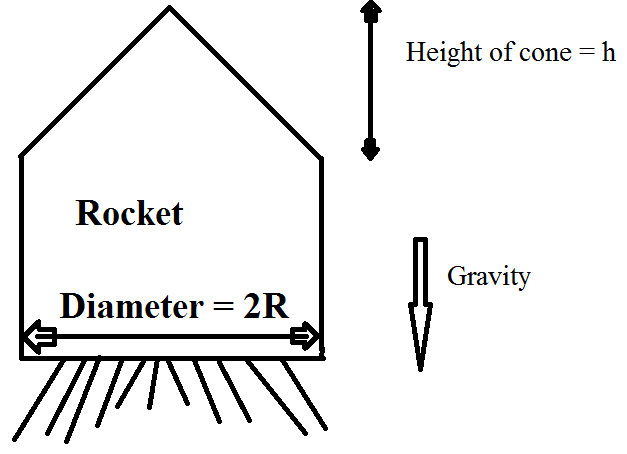Need help In Rocket Physics (1)
 Image
Image
Fuel is ejected from a rocket of mass at a velocity relative to Rocket. Fuel is ejecting at constant rate of . Initial Velocity rocket starts from rest from the surface of earth
( Neglect air and other resistance force in both Cases)
Q1). Assume gravity is constant , Find acceleration, velocity and Thrust as a function of time.
Q2). Assume gravity changes with height from earth surface as , Find acceleration, Velocity and Thrust as a function of time.
No vote yet
1 vote
Easy Math Editor
This discussion board is a place to discuss our Daily Challenges and the math and science related to those challenges. Explanations are more than just a solution — they should explain the steps and thinking strategies that you used to obtain the solution. Comments should further the discussion of math and science.
When posting on Brilliant:
*italics*or_italics_**bold**or__bold__paragraph 1
paragraph 2
[example link](https://brilliant.org)> This is a quote# I indented these lines # 4 spaces, and now they show # up as a code block. print "hello world"\(...\)or\[...\]to ensure proper formatting.2 \times 32^{34}a_{i-1}\frac{2}{3}\sqrt{2}\sum_{i=1}^3\sin \theta\boxed{123}Comments
Is acceleration M0−μtμu ?
Log in to reply
How do you find it ?? I don't know the answer.
Log in to reply
Use conservation of momentum and a=dv/dt.
Log in to reply
You are totally wrong.
We can't apply conservation of momentum as there is gravity and also mass is changing with Time.
Use impulse momentum theoerem in both cases Consider any arbitrary moment in time t and distance y from surface of earth Let us consider that rocket as my system with mass at that point in spacetime as m In time dt let dm mass be ejected absolute velocity of dm is u-v where u is the relative velocity and v is the absolute velocity of rocket at that moment Impulse due to weight is mgdt which is the change in momentum of the system that is rocket After this we form a differentia equation which is dificult to solve in case 2 I am not able to solve the equation In case 1 V= uln(m■\m) -g\p(m■-m) Where m■ is initia mass p is dm\dt